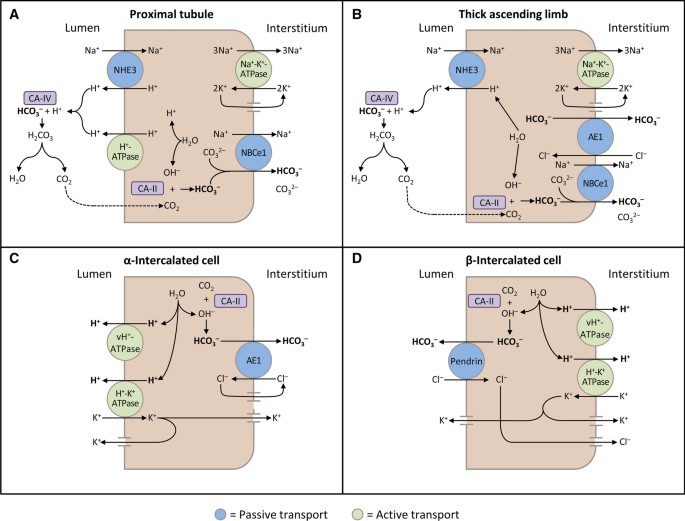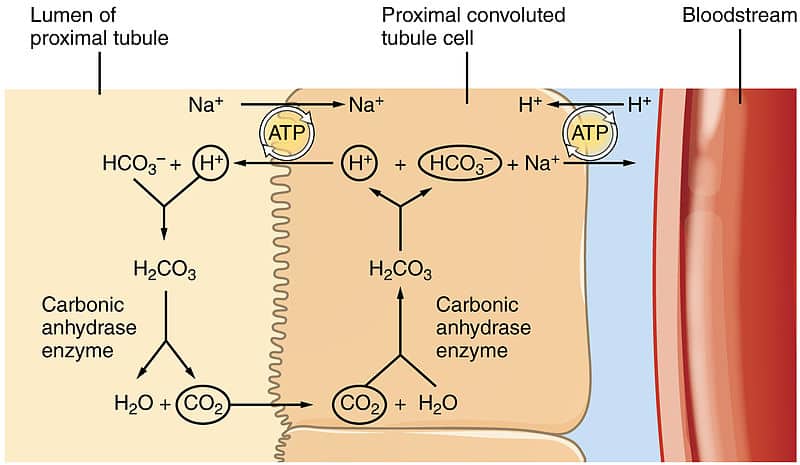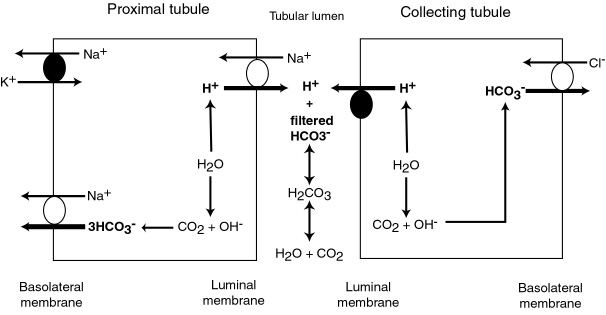How Do Kidneys Make Bicarbonate
Up to 10 cash back Sodium Bicarbonate as a Therapy for Chronic Kidney Disease. We all need bicarbonate a form of carbon dioxide in our blood.

Carbonic Anhydrase An Overview Sciencedirect Topics
Your blood brings bicarbonate to your lungs and then it is exhaled as carbon dioxide.

How do kidneys make bicarbonate. If the blood is too alkaline then the kidney excretes bicarbonate into the urine to restore the balance. Here the kidneys will not only create. Steps 1 and 2 of bicarbonate conservation are indicated.
Bicarbonate also known as HCO3 is a byproduct of your bodys metabolism. Through a carbonic anhydrase reaction similar to the red blood cells hydrogen ions get produced and secreted into the lumen of the nephron. The lungs and kidneys keep a normal blood pH by removing excess acid.
Thus bicarbonate is conserved rather than reabsorbed. Excreted in milliequivalents minus the bicarbonate mEq that might escape in the urine is called NET ACID EXCRETION and equals the milliequivalents of new bicarbonate produced generated by the kidneys to restore the buffer reserves of the body fluids. Bicarbonate concentration is also further regulated by renal compensation the process by which the kidneys regulate the concentration of bicarbonate ions by secreting H ions into the urine while at the same time reabsorbing HCO 3 ions into the blood plasma or vice versa depending on whether the plasma pH is falling or rising.
Healthy kidneys help keep your bicarbonate levels in balance. Return to Renal Physiology Home Page. Kidneys And Baking Soda Your endocrine system produces hormones and enzymes to help breakdown food into nutrients your body can absorb.
4000 to 5000 mmolday. Reabsorption of filtered bicarbonate. Bicarbonate is the predominant extracellular buffer against the fixed acids and it important that its plasma concentration should be defended against renal loss.
The kidneys are slower to compensate than the lungs but renal physiology has several powerful mechanisms to control pH by the excretion of excess acid or. In acid-base balance the kidney is responsible for 2 major activities. Bicarbonate is excreted and reabsorbed by your kidneys.
It is an alkali also known as base the opposite of acid and can balance acid. Inside the cell dissociation of H2O into OH- and H is promoted by hydroxylation of CO2 OH- CO2 HCO3- to generate bicarbonate catalyzed by soluble type II carbonic anhydrase. They excrete hydrogen ions into urine.
It turns out that eating fruits and vegetables may be a safer option and is beneficial for people with chronic kidney disease. It keeps our blood from becoming too acidic. It also signals your pancreas and kidneys to produce sodium bicarbonate which plays a role in neutralizing acidity.
The kidney is capable of excreting acid as ammonium chloride and generating new bicarbonate not just reclaiming filtered bicarbonate when it produces ammonium from glutamine amino acid. Likewise people ask how do the kidneys generate new bicarbonate hco3 -. Metabolic acidosis is a common complication associated with progressive loss of kidney function.
Although short-term studies show some benefit from oral bicarbonate therapy for chronic kidney disease long-term safety data are lacking. The rate of cyclical hydrogen ion secretion changes with the general availability of ECF hydrogen ions. This balance prevents your body from becoming too acid which can cause many health problems.
Tubular cells are not permeable to bicarbonate. The kidneys monitor and control the acidity or acid-base pH balance of the blood. Low bicarbonate levels in the blood are a sign of metabolic acidosis.
The kidneys have two very important roles in maintaining the acidbase balance. Kidneys and AcidBase Balance. It is also possible that salts in the filtrate such as sulfates phosphates or ammonia will capture hydrogen ions.
Figure 2643 Conservation of Bicarbonate in the Kidney. Interestingly the regulatory link between ECF pH and renal bicarbonate excretion does not depend on neuroendocrine mechanisms but results from the dependence of bicarbonate excretion on cyclical hydrogen ion secretion. If the blood is too acidic the kidney makes bicarbonate to restore the bloods pH balance.
They reabsorb bicarbonate from urine. This is the primary way by which kidney can generate bicarbonate and excrete hydrogen in acidemia by increasing renal ammoniagenesis and how it can. On the flipside respiratory acidosis is a condition whereby a prolonged decreased breathing rate causes the bloods pH to fall.
Bicarbonate is a substance called a base which the body needs to help keep a normal acid-base pH balance. The diminishing ability of the kidneys to maintain acid-base homeostasis results in acid accumulation leading to various complications such as impairment in nutritional status worsened uremic bone disease and an association with increased mortality. Your kidneys also help regulate bicarbonate.
The kidney cells produce a constant amount of hydrogen ion and bicarbonate because of their own cellular metabolism production of carbon dioxide.

2 4 Renal Regulation Of Acid Base Balance

Co2 Transport Co2 Is A Waste Product Of Aerobic Metabolism The Body Must Be Able To Eliminate This Waste Product To Maintain Normal Function Co2 Dissolves Out Of The Tissue Cells Into The Blood Stream Where It Is Carried To The Lungs For Elimination Through

Renal Physiology 6 Acid Base Balance Flashcards Quizlet
Http Www Drcroes Com Uploads 8 1 2 8 8128660 Arterial Blood Gas Outline Pdf

Could Someone Eli5 Bicarbonate System In Kidneys Mcat

Bicarbonate An Overview Sciencedirect Topics

The Role Of The Kidney In Acid Base Balance Osmosis

Management Of Severe Hyperkalemia In The Post Kayexalate Era

Renal Tubular Acidosis And Management Strategies A Narrative Review Springerlink

Baking Soda Repairs Kidneys Naturally

Sodium Bicarbonate Kidney Disease All Things Kidney Official

Urinary Regulation Of Acid Base Balance Teachmephysiology

Reclaiming Bicarbonate Via Acid Excretion Eclinpath

Co2 Transport Co2 Is A Waste Product Of Aerobic Metabolism The Body Must Be Able To Eliminate This Waste Product To Maintain Normal Function Co2 Dissolves Out Of The Tissue Cells Into The Blood Stream Where It Is Carried To The Lungs For Elimination Through

The Role Of The Kidney In Acid Base Balance Osmosis

Renal Module Iii Acid Base Balance Flashcards Quizlet

Acid Base Balance Anatomy And Physiology Ii

Post a Comment for "How Do Kidneys Make Bicarbonate"